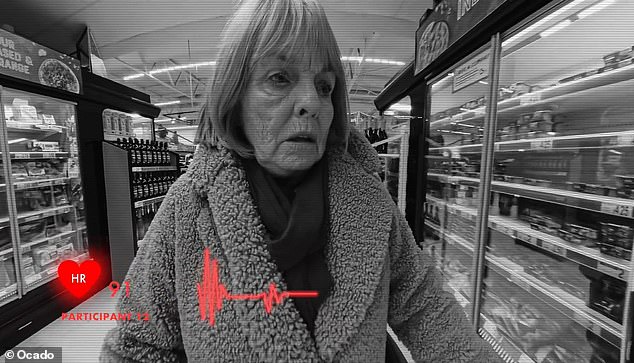It’s starting to look a bit like stress! Research shows that Christmas shopping is just as stressful as taking an exam or a job interview
While there is no doubt that Christmas is a time for celebration and joy, it can also be a major source of stress.
Now a new study shows that the festive grocery shop – an unavoidable task for any festive household – is as stressful as taking an exam or a job interview.
Scientists from Ocado worked with Charles Spence, professor of experimental psychology at the University of Oxford, to assess customers during the big Christmas shopping event.
They fitted 20 volunteers with electrical monitors that could detect an increase in heart rate – a classic sign of stress – as they pushed their cart.
Heart rate increased an average of 44 percent, reaching 115 beats per minute (bpm) while grocery shopping, they found.
This is the same stress level as taking an exam (up to 115 bpm) or conducting a job interview (up to 115 bpm).
It’s also almost as stressful as watching a horror movie (110 bpm).
‘The heart rate increases when we experience stress, as adrenaline pumps through the body – and there’s nothing like the chaos of Christmas shopping to get that going,’ says Professor Spence.
New research shows that the festive grocery shop – an unavoidable task for any festive household – is as stressful as taking an exam or a job interview (file photo)

The heart rate increased by an average of 44 percent and reached 115 beats per minute (bpm) when shopping
In contrast, online shoppers’ heart rates peaked at 82 bpm, which was 29 percent lower than the in-store experience.
This is slightly lower than practicing yoga (80 bpm) and petting a cat (77 bpm).
“Our experiment showed that shopping in stores over the festive period can dramatically increase heart rate and stress levels,” Professor Spence added.
According to Ocado, their research shows that the online store is a ‘much quieter alternative’ at Christmas, which the company ultimately hopes will drive more people to its website.
However, other research has shown that traditional physical shopping has advantages over online shopping.
A Study from 2014 in-person shopping can ease grief and give people a sense of control, which is important to avoid impulsive purchasing decisions.
And as the Covid pandemic has shown, spending more time away from screens in favor of personal connections has been linked to better mental health.
Ocado also surveyed 2,000 adults to find out more about our attitudes towards the big Christmas grocery store.

Scientists fitted 20 volunteers with heart monitors (pictured) to detect increases in their heart rate – a classic sign of stress
A total of 63 percent of people said dealing with long queues is the most stressful part of the store, while 60 percent said it was the big crowds and 39 percent the empty shelves.
Forgetting something at your grocery store (38 percent) and fighting with other shoppers for parking (37 percent) also causes stress to rise above normal.
Other worrying tasks include worrying about staying on budget (32 percent) and carrying heavy bags (29 percent).
Overall, 47 percent said the physical grocery store at Christmas is a stressful experience, while 18 percent said they would even rather clean the bathroom.
“As further consumer research revealed key triggers such as long queues and crowded aisles, it is no surprise that so many Brits would rather scrub their bathrooms than brave the supermarket,” said Professor Spence.
Another factor, cited by 21 percent as the most stressful thing about the festive grocery store, is the loud Christmas music.
This follows research from the University of Bath last year which found that shoppers spend more money when music is playing – at least from Monday to Thursday.
That’s because weekday shoppers tend to be mentally tired from the work week, and music improves their mood, causing them to spend more, the experts said.
During the Christmas period, shops and businesses often play a relatively small sample of festive songs on repeat.
A 2017 study found that holiday music on constant repeat can be mentally exhausting for employees working in retail stores.
According to the American Psychiatric Association, about 61 percent of people experience stress during the Christmas season.
Sources of festive stress include shopping, cooking, spending money and feeling the need to please people – for example friends and in-laws.
